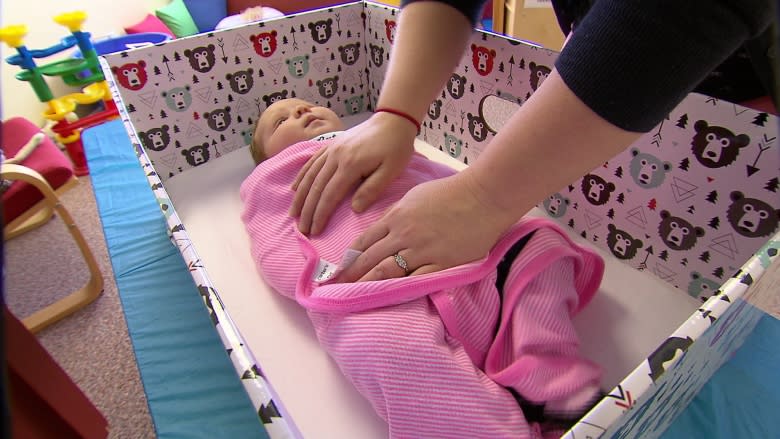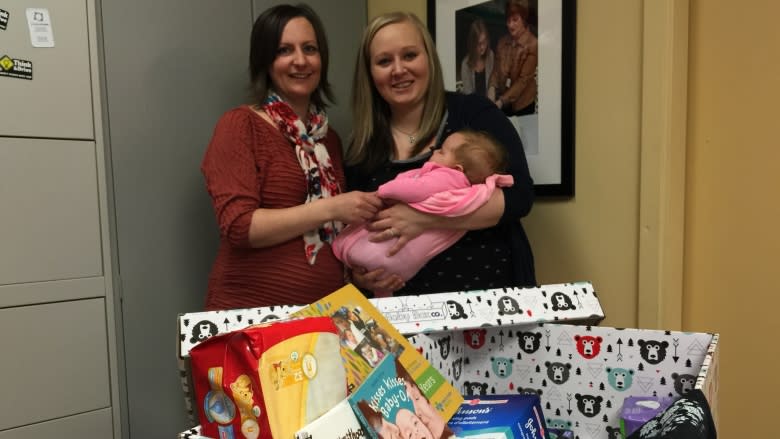Alberta's baby boxes help new parents get through 'terrifying' 1st few months
As Lindsey Cybulskie plays with her cooing two-month old daughter, Carter, the first-time mother is relaxed, like she's been doing this forever.
It's not always so, says Cybulskie, who admits to the same kind of anxiety that plagues most new parents.
"It's terrifying. Everything is so brand new, and you're trying to take care of yourself and your baby, and it's just overwhelming."
Her sister, Tannis Smith, a parent coach at Community Links in Airdrie, Alta., suggested she sign up for a provincial pilot project called Welcome to Parenthood Alberta.
"Being a first-time parent, there are a lot of unknowns," Smith said. "I wanted her to have access to as many different resources that may be helpful to her."
Parents-to-be who take part in the research project get a so-called baby box similar to those used in Finland for more than 75 years.
Every expectant mother in the Scandinavian country is gifted with a box full of essentials, so every baby, no matter their background, gets an equal start in life.
Those layettes filled with basics, along with a robust maternal and child health programs, are widely believed to be part of the reason Finland enjoys one of the lower infant mortality rates in the world, slightly below Canada's rate.
Essentials for baby and parents
The Alberta baby boxes are stuffed full of everyday items, from diapers to onesies to receiving blankets and even hygiene items for new mothers like nursing pads.
Cybulskie was most grateful for something she hadn't even thought to purchase.
"There's a baby thermometer in there. We ended up using that a lot because right after she was born, she was a little jaundiced."
Once emptied, the box doubles as a bassinet, complete with a safety-approved foam mattress. Cybulskie says her family has put it to good use.
"Especially in the first two weeks, my husband took the box in the living room, and he would watch her (Carter), so I could have some sleep."
An engagement tool
Karen Benzies of the University of Calgary's Faculty of Nursing is the lead researcher on the project. She says the box is just a starting point.
"It's an engagement tool. Every parent needs a little help. Most first-time parents don't know what they don't know," she said.
Participants in Welcome to Parenthood choose a mentor from their own social circle — a family member, neighbour or friend — who will commit to regular contact with the new parents before and after the birth of their baby.
During regular visits, they chronicle the first six months of the lives of the family in a journal, keeping track of developmental milestones and the mental and physical health of the baby and the parents. Both mentors and parents periodically fill out questionnaires to help with this tracking.
Tannis Smith, who is seven and a half months pregnant with her fourth child, is acting as a mentor for her sister, Lindsey Cybulskie.
"I think we bring each other constant support and comfort," Smith said. "I think I have some different experiences that I can share with her."
Talking it out
For Cybulskie that mother-mentor relationship she's established with her sister means they often have conversations that may not have happened if they weren't creating a journal for the research program.
"She's asking what my needs are this week and what I'm feeling and if I need support," Cybulskie said. "We're talking about things I need to know about parenting, and I can ask her questions."
The mentors are trained to know what resources are available to the new parents and baby and how to access them.
"I think it helps Carter get what she's needing, quicker," Smith said.
Success spells healthy parents and children
Smith and the Cybulskie family are among the first 50 participants recruited to the study, which will eventually follow 1,500 families and mentors at 11 sites across Alberta.
The year-long study is funded by a $500,000 research grant from Alberta Human Services.
If the data shows successful outcomes, the pilot project could become a large-scale program in Alberta.
Benzies isn't jumping to any conclusions before the investigation is complete and the data is analyzed.
As a researcher, I'm always skeptical," she said. "We need evidence to say that this is the right thing to do to improve outcomes for children and families. The success for us and for society is around healthy parents and healthy children."
Cybulskie and her young family say they are already seeing benefits from the program.
"I could not imagine giving birth and then not having all the people around me that I have," she said as Carter slept soundly in her arms. "I feel incredibly lucky to have those resources around to help me through all of this."



